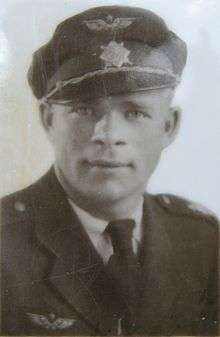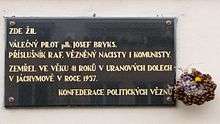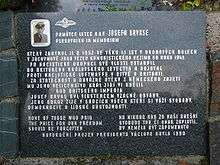Josef Bryks
| Josef Bryks | |
|---|---|
 Josef Bryks | |
| Born |
18 March 1916 Lašťany, Moravia now Bělkovice-Lašťany, Czech Republic |
| Died |
11 August 1957 (aged 41) Ostrov nad Ohří, Czechoslovakia now Czech Republic |
| Buried at | Prague |
| Allegiance |
|
| Service/branch | No. 242 Squadron RAF, Royal Air Force |
| Years of service | 1937 – 1945 (1948) |
| Rank |
Flight Lieutenant Brigadier General (posthumously) |
| Battles/wars | Second World War |
| Awards |
Order of the British Empire (MBE) Order of the White Lion (posthumously) and many others |
Flight Lieutenant Josef Bryks (Czech pronunciation: [ˈjozɛf brɪks]; 18 March 1916, Lašťany, now Bělkovice-Lašťany – 11 August 1957,[1] Ostrov nad Ohří) was a Czechoslovak soldier and fighter pilot, who went abroad at the start of the Second World War to fight against Nazi Germany. He served with the Royal Air Force, but his aircraft was shot down and he was captured. He tried to escape several times, succeeding three times, but each time was recaptured afterwards. After the war he was a victim of political repression in communist Czechoslovakia, imprisoned and forced to work in uranium mines. He died of a heart attack in the prison hospital. He was rehabilitated after the fall of communism in 1989 and posthumously promoted to the rank of Brigadier General.
Before the Second World War
Josef Bryks was the seventh of eight children of farmer František Bryks and his wife Anna Bryksová. He studied at the Commercial Academy in Olomouc and in June 1935 passed his Matura (final exam of secondary education). In October he entered the Czechoslovak Army. He started his service at a cavalry regiment in Košice. At the same time he studied at a school for cavalry officers in Pardubice until 1936. Between 1936 and 1937 he continued his studies at the Military Academy in Hranice, where he changed his focus from the cavalry to the air force. He was promoted to the rank of lieutenant with the specialization of an aerial observer. Between 1937 and 1938 he was trained as a pilot in Prostějov.[1]
During the Second World War
At the beginning of the Nazi occupation of Czechoslovakia he helped to organize escapes of Czechoslovak pilots to Poland. He married Marie Černá. Their daughter died two days after her birth. On 20 January 1940 Josef Bryks escaped abroad, but he was arrested and for some time imprisoned in Hungary for illegal entry from the Slovak Republic, at that time a Nazi puppet state which had separated from Czechoslovakia in 1939. The Hungarians extradited him to the Slovak authorities, but he managed to escape and continued through Hungary, Yugoslavia, Greece, Turkey and Syria into France. Before he got a chance to fight there, he was evacuated to the United Kingdom.[1]
Here he joined No. 310 Squadron RAF for a few days, but there were enough pilots and Bryks was moved to some civilian and logistic departments of the Royal Air Force. His English was quite fluent thanks to his secondary school studies and this helped him to join No. 242 Squadron RAF in April 1941. He was trained as a night fighter pilot, but later his squadron moved from Stapleford Aerodrome to North Weald Airfield where it took part in daytime offensive missions over western Europe. His aircraft, Hawker Hurricane Mk. IIB, was shot down near Lille on 17 June 1941, probably by Adolf Galland, the most successful Luftwaffe fighter pilot of those days.[1]
Bryks tried hiding for a short time but then he was arrested by the Nazis. He kept his identity secret and pretended to be British, because Nazi Germany considered Bohemia and Moravia to be a part of their dominion and would treat him as a traitor. He tried to escape five times and succeed three times, but was always caught afterwards. During his second escape he tried to fly away in a Messerschmitt Bf 109 modified for night flying. During his third attempt he joined the Polish Armia Krajowa. He was brutally tortured after he was caught this time[1] and sentenced to death for helping the Polish resistance movement,[2] but the death sentence was not executed. Finally his true identity was revealed when British allies sent the Nazis a document of his military promotion that included his real name and nationality. He was sent to the Prague gestapo, but due to the intervention of protecting powers he was sent back to the prison camp again. The Allied Army set him free in 1945. Bryks underwent several surgeries (the last of them in summer 1946) due to his injuries from the war.[1]
After the Second World War

a member of the RAF. He was imprisoned by Nazis and by communists.
He died at the age of 41 in the uranium mines
in Jáchymov in 1957. Confederation of Political Prisoners.
Due to injuries sustained as a prisoner Josef Bryks was not able to serve as a pilot again. His wife, who had divorced him and remarried, committed suicide before the end of the war, in April 1945. On 18 June he married English post office clerk Gertruda Rose, the widow of a British pilot, with whom he had corresponded from captivity through the Red Cross. He returned to Czechoslovakia with her on 6 October 1945.[1]
He received a number of British and Czechoslovak honours.[1]
British honors:
- Member of the Order of the British Empire (MBE)
- 1939–45 Star
- Air Crew Europe Star
- War Medal 1939–1945.
Czechoslovak honors:
- Czechoslovak War Cross 1939–1945. He received it three times.
- Czechoslovak Medal For Gallantry in the Face of the Enemy (Czech: Československá medaile Za chrabrost před nepřítelem). He received this two times.
- Czechoslovak Military Medal for Merit, 1st class (Czech: Československá medaile Za zásluhy I. stupně)
- Commemorative Medal of the Czechoslovak Army Abroad (Czech: Pamětní medaile čs. zahraniční armády) with plates of Great Britain and France on the ribbon.
He was promoted to the rank of Captain in September 1945, "Headquarter Captain" (Czech: štábní kapitán) in December 1945 and Flight Lieutenant[3] in May 1946.[1] He became a teacher of English language and aeronautics at the Secondary School of Aviation in Olomouc.[1]
In 1946, Basil Dearden directed the British film drama The Captive Heart based on the real experiences of Josef Bryks.[4][5]
Persecution after February 1948
The political situation changed rapidly after the Czechoslovak coup d'état of 1948. He was sent on leave of absence and transferred to the military reserve force. His political opinions made his superior officer Colonel Václav Fuksa to write that Bryks was "untrustworthy for his political irresponsibility and for the lack of understanding of the ideology of People's Democracy".[1]
Josef Bryks was arrested for preparation of his escape abroad on the night between 2 and 3 May 1948,[1][2] about 10 minutes after midnight.[6] He was judged by a military court between 14 and 16 July 1948 and he was found innocent, because Communists had no control over these courts yet. A new trial was held on 9 February 1949.[1] Bryks was found guilty and he was unjustifiably sentenced to punishment in prison for 10 years.[1] Protests by his wife against this miscarriage of justice were addressed to the General Secretary of the Communist Party of Czechoslovakia Rudolf Slánský, but it was a futile protest.[1]
According to a custodial document Bryks tried to escape. He was sentenced to additional 20 years (together 30 years) of prison in another trial between 11 and 12 May 1950.[1] Bryks behaved insubordinately in various prisons in Czechoslovakia. Finally he was moved to a Jáchymov uranium mine called "Equality" (Czech: Rovnost) in Ostrov nad Ohří. He started to behave well and worked hard, because he supported his family and his ill father, sending earned money to them. Communists prohibited sending the money to his family in December 1955 and Bryks returned to resistance. His health became worse and he suffered a heart disease. He died of a myocardial infarction in the custodial hospital in Ostrov nad Ohří at 23:00 on 11 August 1957.[1]
His remains were not given to his family and Josef Bryks was secretly buried by communists at a cemetery in Prague-Motol in 1965.[7]
Rehabilitation after 1989

He was partly rehabilitated after the November 1989 Velvet Revolution,[8] his full rehabilitation became complete in 2006.[5][9]
He also received several posthumous honours: on 29 May 1991, he was posthumously promoted to the military rank of Colonel[1] and in 2008 to the rank of Brigadier General.[10]
A memorial plaque to him was revealed in his birthplace Bělkovice-Lašťany on 4 June 1994. He was honoured with the Award of the City of Olomouc for "bravery and courage during the Second World War" in 2004.[11]
On 28 October 2006, he was awarded the highest order of the Czech Republic, the Order of the White Lion, military division, 2nd class.[12]
The Czech television made a documentary film Muž, který přecenil českou duši aneb Útěky Josefa Brykse (English: A Man Who Overestimated the Czech Soul or Escapes of Josef Bryks) in 2007.
Two streets in Prague-Černý Most II. and in Olomouc-Slavonín were named after him.[13]
In 2009, historians discovered that the funeral urn with the ashes of Josef Bryks was secretly buried by communists at the cemetery in Prague-Motol in 1965 – eight years after Bryks' death. After this information was published, his widow Gertruda Bryks visited his grave, 52 years after his death.[7]
References
This article incorporates CC-BY-SA text from translation Josef Bryks from the Czech Wikipedia on 29 October 2009.
- 1 2 3 4 5 6 7 8 9 10 11 12 13 14 15 16 17 18 (Czech) Úřad MČ Praha 14 (in English: Office of administrative district Prague 14). Josef Bryks. Accessed 14 November 2009.
- ↑ War Office: Directorate of Military Intelligence (1945–1946) Catalogue reference WO 344/45/2. Available at the National Archives, Kew, http://www.nationalarchives.gov.uk/documentsonline/wo373.asp (search Bryks). Accessed 14 November 2009.
- ↑ (Czech) Srdce v zajetí. Accessed 13 November 2009.
- 1 2 (23 February 2009) Czech RAF pilot widow's compensation claim returns to beginning. Accessed 13 November 2009.
- ↑ (Czech) (2007) Muž, který přecenil českou duši aneb Útěky Josefa Brykse. Film documentary by Czech television.
- 1 2 (Czech) Navara L. & Gazdík J. (10 October 2009) Hrob válečného hrdiny Brykse našla jeho žena po 52 letech. iDNES.cz Accessed 12 November 2009.
- ↑ (Czech) Navara L. (7 November 2005) Letec Bryks: hrdina, či kriminálník?. Accessed 12 November 2009.
- ↑ (6 May 2006) Prague court exonerates pilot victim of Communist show trials. Accessed 13 November 2009.
- ↑ (Czech) Frydecká L. & Wirnitzer J. (14 November 2008) Klaus povýšil stíhače RAF Brykse, který před 50 lety zemřel v lágru. iDNES.cz Accessed 12 November 2009.
- ↑ (Czech) (1 June 2005) Cenu města převezme také ministr Dostál. Accessed 12 November 2009.
- ↑ Order of the White Lion - List. Accessed 13 November 2009.
- ↑ (Czech) (16 March 2006) Olomouc má nové názvy ulic. Accessed 12 November 2009.
External links
| Wikimedia Commons has media related to Josef Bryks. |
- (Czech) detailed biography
- (Czech) (6 March 2006) Josef Bryks — zapomenutý hrdina at Confederation of Political Prisoners of the Czech Republic website
- (Czech) Navara L. (7 November 2003) Letec Bryks: hrdina, či kriminálník?
- (Czech) http://www.bryks.cz – website about documentary Muž, který přecenil českou duši aneb Útěky Josefa Brykse
- (Czech) film documentary Muž, který přecenil českou duši aneb Útěky Josefa Brykse – film stream on the Czech television website